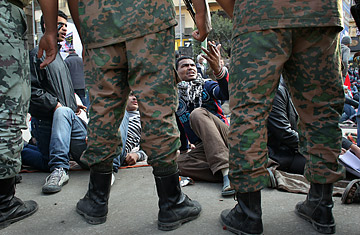
Two days after the resignation of President Hosni Mubarak, Egyptians in Cairo stage a Feb. 13, 2011, sit-in in response to the army's order to tear down encampments in Tahrir Square
(2 of 2)
While grateful for his freedom, Youssef hasn't forgotten those still in custody. On Saturday, he, along with dozens of other young men and women, stood outside the imposing headquarters of the Military Tribunal in Nasr City, where many of the detainees are reportedly being held. Youssef was one of five young Tahrir activists allowed to meet on Saturday with senior military personnel in the building to lobby for the release of their detained comrades. He says the officers who addressed them "talked to us the way they talk to dogs," not in the fatherly tones heard previously in Tahrir Square. "There's no more baba," he says wryly as he lights one cigarette after the other.
"They told us that the situation in the country is very bad, and that we were disturbing the peace. They said our friends will be tried in military courts and that they will face not less than one year's prison for terrorizing civilians, among other charges," he says, adding that the officers told him the women would be "pardoned."
Human Rights Watch has called on Egypt's ruling Supreme Military Council to investigate and prosecute allegations of torture by the army, and to stop prosecuting civilians in military tribunals. "There can be no break from the abuses of the past while security forces — including military personnel — abuse people with impunity," Joe Stork, deputy Middle East and North Africa director at Human Rights Watch, recently said in a statement.
But in the new Egypt, some of the security forces don't appear to have changed their ways. One of the revolution's main demands had been for the dissolution of the dreaded state security network associated with the police force. Newly appointed Interior Minister Mansour el-Essawy had initially said that was a nonstarter, but on Tuesday he acquiesced to the demand. Still, its unclear how much will really change, given that el-Essawy said that a new national security agency would be formed in its place.
State security was a force of some 170,000, el-Essawi said. The new agency's mandate will be restricted to combating terrorism and espionage rather than spying on citizens. But preventing domestic terrorism would possibly require spying on its citizens.
The new minister's comments came just days after several offices of the much feared state security agencies, including the internal spy agency's Cairo headquarters, had been stormed by civilians who unearthed thousands of documents purportedly containing detailed surveillance of activists, artists, Muslim Brotherhood members, politicians and regular citizens. Some reportedly detailed torture; others were said to be more salacious and included sex tapes. Although 47 state security officers were arrested this week for their involvement in shredding and burning documents, it's unclear if anybody will be held accountable for the human-rights abuses detailed in the files.
"Nothing will happen to the security agencies," General Fouad Allam, former deputy chief of state security, told TIME recently. This idea that everything is going to change — no, it's wrong. There can be a change in ideas, a different approach, but you don't eliminate a system."
Khalid, the 20-year-old Tahrir veteran, doesn't know what has happened to his two friends, but his experience hasn't shaken his support for the army. "When the army first went down to the square, we were very happy, saying the army and the people are one hand. I still say that. I think it was a one-off, an isolated incident, but there is something going on and I don't understand it," he says. Former Prime Minister "Ahmed Shafiq and Mubarak are not being tried and they want to try us in military courts for peacefully protesting?" he adds. "I don't know why they are acting like this."
